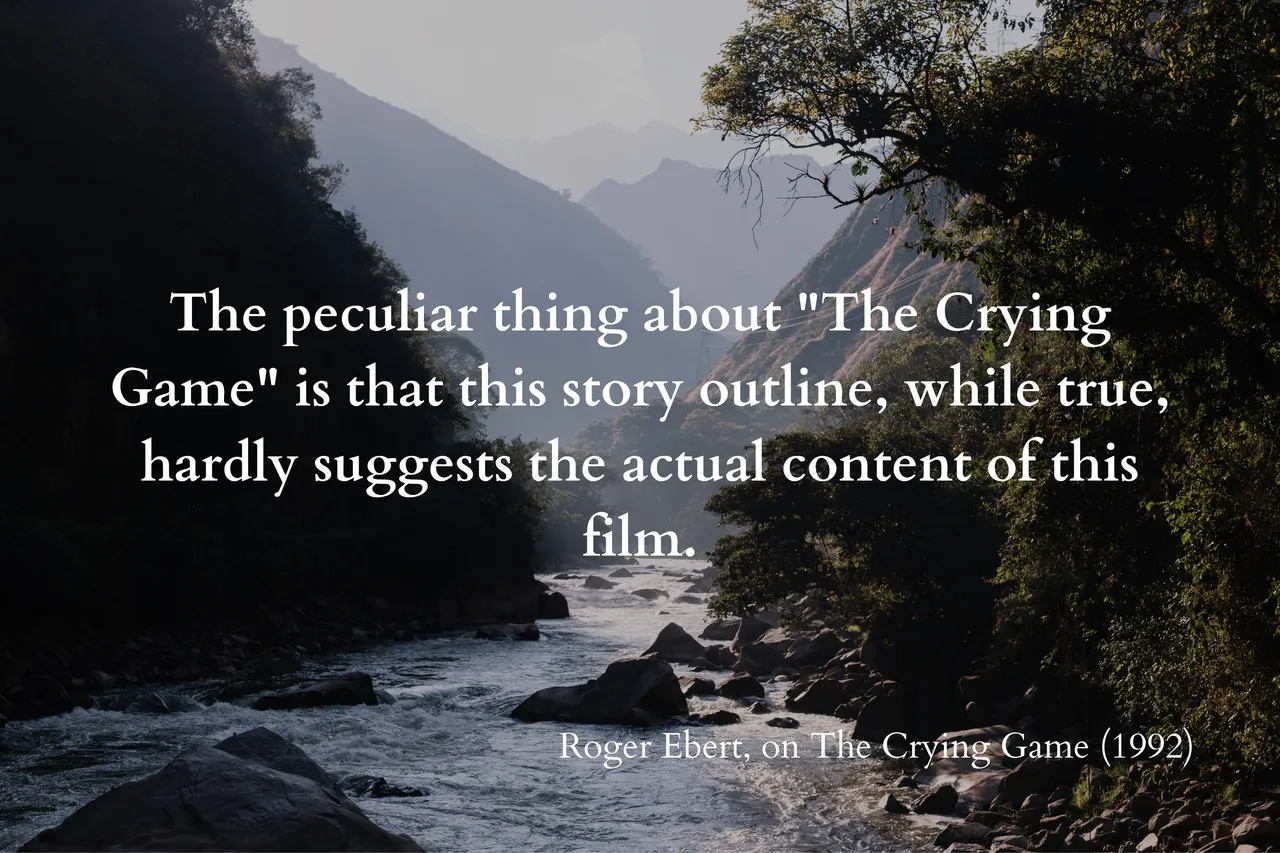
This Movie Is the 26th Best British Film of All Time
The Crying Game also premiered in 1992. Without claiming too much, I must admit this film's quality is evergreen. A compelling narrative with unique storytelling, I'm surprised Neil Jordan's picture didn't come out yesterday. It's that contemporary.
In fact, I agree with Roger Ebert's review so much I followed his advice without even reading it. First, I saw the movie before I read the review. He didn't spoil a thing, which speaks to beautiful criticism paired with concise writing. I also will not spoil a thing about the movie and encourage you the way he did.
"See this film. Then shut up about it."
That course of action, unfortunately, doesn't leave you very much to read. As such, I'll take the time to respond to Ebert's review.

My Review Is A Response To Roger's
Roger Ebert's review of "The Crying Game" praises it as one of the best films of 1992 that keeps the audience guessing and caring simultaneously.
Ebert commends the film for involving the audience deeply with its story and then revealing unexpected developments, comparing it to Hitchcock's "Psycho." But I haven't seen that. For contemporary viewers, I wasn't this impressed by a modern plot since Spike Jonze's Her (2013), which I discussed here. The complexity of The Crying Game's plot kept me guessing til' the end.
The characters, particularly Fergus and Dil, are well-crafted and evoke empathy. But I sympathized intensely with Jody. A knowledgeable, young black male played by Forest Whitaker, Jody recounts a fable about a scorpion and frog to discuss people.
The film isn't summed up by a simple adage, but throughout viewers ponder: Can they help it? Or is it truly one's nature?
By the end of the film, even more than I expected, Fergus surprised me. Dil, the woman that she is, kept it real the entire time. The love story that unfolds is described as a surprising and emotionally rich aspect of the film. Watching it with my partner, Melani and I agree the film defies typical love story conventions by keeping the audience uncertain about how everything's going to turn out.
Ebert emphasizes the importance of casting in the film's success. Roger touches on a few things that go over this viewer's head, but even to a layman, Fergus spoke volumes. Stephen Rea's portrayal of Fergus captures the essence of a good person entangled in a life of violence. At times, it didn't even feel like a movie. I could see myself, pressured by peers to "do what must be done" and the conflict on my face deliberating my choices.
The political themes also escaped me. I don't understand the history nor significance of the factions. Yet, the complexity of those characters didn't lose me. In fact, their complexity made them feel really real.
The best part about this picture is that the conversation around such rich topics like identity and sex achieves a quality of timelessness not found in film today. Some aspect or another dates most pieces yet, The Crying Game escaped 1992 to leave an impression so lasting 32 years later, only the close-minded today would not enjoy it. In other words, those with preconceived notions might not appreciate the feat Neil Jordan accomplished.

A Movie for Tasteful Movie Goers
In summary, Ebert applauds "The Crying Game" for many things. I liked its intricate plot and character development. I can't judge casting choices, but those actors told the story well. This isn't your average Disney-Marvel comic book hero movie mill with its overall unexpected and challenging storytelling. I can't help but agree on all counts, despite not appreciating all of Roger's points. That's just the allure of the movie, though. Anyone at a glance will feel the same: this movie's good. So do what Roger says: See this film. But I wouldn't shut up about it til' I tell someone, maybe that's just me.